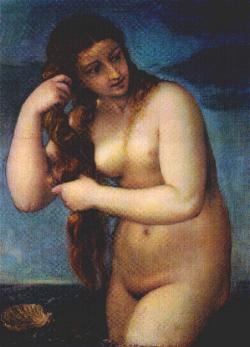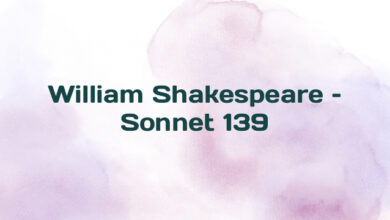
William Shakespeare – Sonnet 149
Canst thou, O cruel! say I love thee not,
When I against myself with thee partake?
Do I not think on thee, when I forgot
Am of my self, all tyrant, for thy sake?
Who hateth thee that I do call my friend,
On whom frown’st thou that I do fawn upon,
Nay, if thou lour’st on me, do I not spend
Revenge upon myself with present moan?
What merit do I in my self respect,
That is so proud thy service to despise,
When all my best doth worship thy defect,
Commanded by the motion of thine eyes?
But, love, hate on, for now I know thy mind,
Those that can see thou lov’st, and I am blind.
A sonnet that is one of the ‘frenzied’ group that starts with 147, My love is as a fever longing still, and continues up to150, possibly also including the last two of the series, 151 and 152. What is striking about this one is the number of echoes it brings back from the earlier sonnets to the youth, perhaps because it is seeking deliberately to contrast the pure love of that period with the tainted love he has for his dark lady, possibly because the language of love, as it was then defined, forced upon the sonneteer a certain number of conventional ideas which were used and re-used, many re-appearing frequently in slightly different clothing, like a play which is performed by too few actors. Here the poet protests his devotion to his cruel beloved, detailing the many ways in which he has shown willingness to serve her. Nevertheless she is unresponsive, and does not repay love with love. His conclusion is framed in the conventional terms of the blindness of love, and the deduction that his mistress does not love those who cannot see what is before their eyes. It is probably not necessary to interpret the conclusion in any real psychological sense, for one suspects it has little or no bearing on what the woman herself was thinking. Its importance is more that it shows the poet casting round desperately for a solution, trying to come to terms with his rejection, and in the end only succeeding in explaining it in terms of rather worn out sonneteering conventions, which leave him as blind as ever.
The 1609 Quarto Version
CAnſt thou o cruell,ſay I loue thee not,
When I againſt my ſelfe with thee pertake :
Doe I not thinke on thee when I forgot
Am of my ſelfe, all tirant for thy ſake?
Who hateth thee that I doe call my friend,
On whom froun’ſt thou that I doe faune vpon,
Nay if thou lowrſt on me doe I not ſpend
Reuenge vpon my ſelfe with preſent mone?
What merrit do I in my ſelfe reſpect,
That is ſo proude thy ſeruice to diſpiſe,
When all my beſt doth worſhip thy defect,
Commanded by the motion of thine eyes.
But loue hate on for now I know thy minde,
Thoſe that can ſee thou lou’ſt,and I am blind.
Commentary
1. Canst thou, O cruel! say I love thee not,Canst thou = are you really capable of (saying).
O cruel – the cruelty is traditional, in that the beloved was always considered so because of her refusal to yield to the lover’s demands. Compare Sidney:
Yet since my death-wound is already got,
Dear killer, spare not thy sweet cruel shot: A&S.48
and
Now will I teach her that she,
When she wakes, is too, too cruel. A&S.2nd.song. The poet here seems to be responding to an antecedent complaint of the beloved, namely, that he did not love her, but was merely making a show of it. This corresponds to various other ‘reply’ sonnets, such as
I grant thou wert not married to my muse 82
O never say that I was false of heart 109
Accuse me thus: that I have scanted all 117
O call not me to justify the wrong 139
However it may owe as much to the conventions which dictated how sonnets were to be written as to any specific situation or prior words exchanged between the poet and his mistress.2. When I against myself with thee partake?When = since, if. I.e. You are not justified in saying I do not love you when it is obvious that etc. when here does not have a temporal significance, for he is not so much citing occasions on which he takes her part against himself, but rather drawing attention to the general disposition that he has to behave in that way. The following when in line 3 does however refer more to specific occasions.
against myself with thee partake – the use of partake meaning to take part in some sort of action against someone or something in conjunction with another, either legally or militarily, is not a common usage. OED gives only this example, presumably seeing it as a nonce usage (OED.5). However it is close in thought to a sonnet written to the beloved youth:
Thy adverse party is thy advocate–
And ‘gainst myself a lawful plea commence: 35
Note that part(y), part(ake) and against myself is common to both sonnets, and the meaning is similar. It may be significant that sonnet 35 excuses the youth’s unfaithfulness perhaps with this same woman, so the verbal relation between the two poems creates an additional tension between them.3. Do I not think on thee, when I forgotDo I not think on thee = (Can you not see that) I think about you, think of you. Compare:
…………..Think on me,
That am with Phoebus amorous pinches black,
And wrinkled deep in time. A&C.I.4.27-9.
When I forgot / Am of myself = when I am neglectful of myself, when I am bewildered, when I ignore my own interests. The bold construction, with an unexpected inversion of words split by a line ending, gives the sense of having lost one’s way, a physical demonstration of the state of mind he is in. The sophistication and density of meaning in these two lines suggests that this is not an early poem.4. Am of my self, all tyrant, for thy sake?
Am of myself – see the note above.
all tyrant for thy sake = being entirely a tyrant against myself because of you, on your behalf. tyrant however could be a vocative addressed to the beloved, ‘You tyrant!, I have neglected myself, and all for your sake’. The syntax allows various meanings to make themselves felt, all of which may be intended. The beloved as tyrant was proverbial. Compare:
Thou art as tyrannous, so as thou art,
As those whose beauties proudly make them cruel; 131
which also uses the epithet cruel. Sidney uses tyrants to describe his mistress’s eyes:
Oh eyes, whose humble looks most glorious prove,
Only loved tyrants, just in cruelty,
Do not, oh do not from poor me remove, A&S.41.
And rather more harshly in the fifth song:
I lay then to thy charge unjustest tyranny,
If rule by force without all claim a tyrant showeth;
For thou dost lord my heart, who am not born thy slave,
And, which is worse, makes me, most guiltless, torments have;
A rightful prince by unright deeds a tyrant groweth.
Lo, you grow proud with this, for tyrants make folk bow:
Of foul rebellion then I do appeach thee now; A&S.5th song.5. Who hateth thee that I do call my friend,I.e. I hate all those whom you hate, I frown on all those whom you frown upon, and I lour upon those etc. Probably an echo of the Psalms:
Do not I hate them, O Lord, that hate thee? 139.121.
friend – this could apply to male or female friends.6. On whom frown’st thou that I do fawn upon,frown’st thou = do you frown? Also, as line 2, reminiscent of a sonnet to the beloved youth:
Bring me within the level of your frown,
But shoot not at me in your wakened hate; 117.
fawn = To affect a servile fondness; to court favour or notice by an abject demeanour. (OED.3.).7. Nay, if thou lour’st on me, do I not spendNay – an interjection which intensifies what follows, as in 71
Nay, if you read this line, remember not
The hand that writ it; for I love you so 71
lour’st = look threateningly upon. The word lour is still current, but nowadays not often used, except perhaps in connection with skies and clouds. It is not common even in Shakespeare, but this instance from Richard III shows it also being used in the same breath as ‘frown’:
The sun will not be seen to-day;
The sky doth frown and lour upon our army. R3.V.3.282-3.8. Revenge upon myself with present moan?spend / Revenge upon myself = take revengeful action against myself. As SB points out, the phrase is unidiomatic and odd, but perhaps the word spend helps partly to suggest wasteful and useless prodigality, as in
Why so large cost, having so short a lease,
Dost thou upon thy fading mansion spend? 136
present = immediate.
moan = sorrow, suffering, lamentation. As in the well known song from Cymbeline:
Fear no more the lightning flash,
Nor the all-dreaded thunder-stone;
Fear not slander, censure rash;
Thou hast finished joy and moan:
All lovers young, all lovers must
Consign to thee, and come to dust. Cym.IV.2.271-6.
Besides its general sense, moaning was also a particular affectation of the courtly lover. Sidney uses ‘to (be)moan’ to describe the lover’s condition half a dozen times, the following example being typical:
Because I breathe not love to every one,
Nor do not use set colors for to wear,
Nor nourish special locks of vowed hair,
Nor give each speech the full point of a groan,
The courtly nymphs, acquainted with the moan
Of them, who in their lips Love’s standard bear;
“What he?” say they of me. “Now I dare swear,
He cannot love. No, no, let him alone.” A&S.54.9. What merit do I in my self respect,
What merit = what desert, what worthwhile qualities. This also recalls an earlier sonnet:
O, lest the world should task you to recite
What merit lived in me, …………… 72.
respect = value, look up to. OED.4.b. This and despise in the next line are related etymologically. The Latin roots are respicere and despicere, ‘to look (back) upon’, and ‘to look down upon’. respect echoes several lines in previous sonnets to the youth, perhaps most notably the two following:
When as thy love hath cast his utmost sum,
Call’d to that audit by advised respects; 49
Then others for the breath of words respect,
Me for my dumb thoughts, speaking in effect. 8510. That is so proud thy service to despise,thy service = service and duty to you. The lover considered himself bound to serve his mistress. Compare to the youth:
Lord of my love, to whom in vassalage
Thy merit hath my duty strongly knit, 26.
Sidney also speaks of service to his mistress, as do other sonnet writers.
to despise – see the note above. In sonnet 129, the meditation against lust, he speaks of the object of passion being very rapidly despised:
Enjoy’d no sooner but despised straight, 129
It may be that he is hinting here that the service he offers is something innately to be despised. Service could have a bawdy meaning, (i.e. fulfilling the service of sexual demands) as also do potentially many of the words in this sonnet – partake, lour’st (lowerest), spend, proud, defect, motion.11. When all my best doth worship thy defect,all my best – the best part of me, my best talents. An echo here of
So all my best is dressing old words new,
Spending again what is already spent: 76.
and also perhaps of :
All these I better in one general best.
Thy love is better than high birth to me, 91.
and also
And worse essays proved thee my best of love.
Now all is done, have what shall have no end: 110.
Note the use of spend in this sonnet also (line 7), echoed in the extract from 76 above.
defect = faults. The use of the singular noun perhaps suggests that the whole of the woman is a defect of nature. However it is parallelled in
That thou art blamed shall not be thy defect, 70
and there is also an echo in
Against that time, if ever that time come,
When I shall see thee frown on my defects, 49
defect is possibly a reference to the female pudenda, based on the understanding that a woman was a defective man, lacking various parts. Partridge does not document it, but there may be a hint of the meaning in
………………………………I saw her once
Hop forty paces through the public street;
And having lost her breath, she spoke, and panted,
That she did make defect perfection,
And, breathless, power breathe forth. AC.II.2.232-6.
and also in Midsummer Night’s Dream, when Snout mixes up words:
Nay, you must name his name, and half his face must
be seen through the lion’s neck: and he himself
must speak through, saying thus, or to the same
defect,–‘Ladies,’–or ‘Fair-ladies–I would wish
You,’–or ‘I would request you,’–or ‘I would
entreat you,–not to fear, not to tremble: my life
for yours. MND.III.1.33-9.12. Commanded by the motion of thine eyes?Told by you what to do, by your eyes imperious movements. Eyes and motion seem to be linked in sonneteers minds:
Those looks, whose beams be joy, whose motion is delight,
That face, whose lecture shows what perfect beauty is: A&S.77.13. But, love, hate on, for now I know thy mind,love = my beloved (the dark lady).
hate on = continue to hate me, go on hating me.
for now I know thy mind = for now I understand how your mind works, for now I know what your true intentions are.14. Those that can see thou lov’st, and I am blind.
Those that can see thou lov’st = you love only those who have sight, who are not blind. 13-14.
There does not seem to be an obvious connection between the thought of the couplet and what has preceded it. The blindness that the poet now invokes is not evident in his behaviour, described in the rest of the sonnet, so one is forced to conclude that he imagines it to be symptomatic of his general debility, servitude, failure and inability to wrench himself away from the woman whom he thinks he should despise. One has to add mentally some additional explanation as to why the mistress loves those who can see in preference to those who can’t. The hatred which he enjoins her to continue in line 13 is conventional, (see for example the commentary to Sonnet 145.) It was expected of a mistress, and therefore not difficult to find. The poet therefore concludes that, since he is hated, others must be loved, and since he has blinded himself with his adoring vassalage, and still not secured her favours, she must love those who behave differently and are perhaps less devoted to her, because they see her clearly and know how to evaluate her faults.
On the other hand it is ahistorical to assume that the reasons for loving or not loving given in any sonnet sequence bear any resemblance to reality or have psychological verisimilitude. It is quite possible, indeed probable, that the situation depicted here, if it is based on fact, attempts to resolve a question for the speaker, but does not touch at all upon the feelings of the woman, or offer any insight into how she views the affair. The concluding couplet seems more like a desperate throwing in of the towel, a recognition that there is no explanation of her cooling love, or none that could satisfy him, and so he casts around for an answer in mythological terms, which has to suffice for the time being, until the next bout of self-questioning comes to haunt him.





